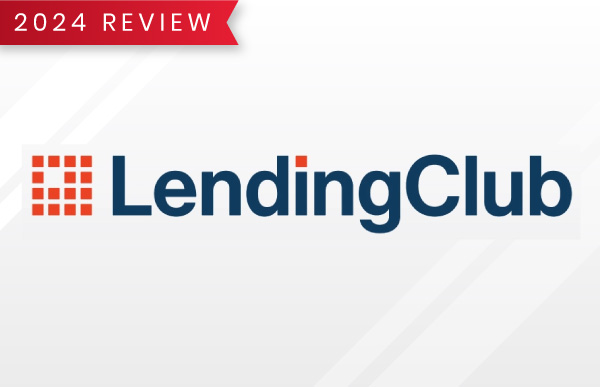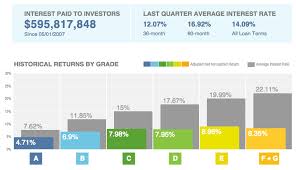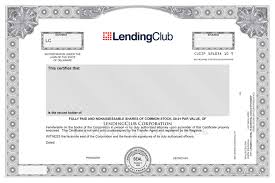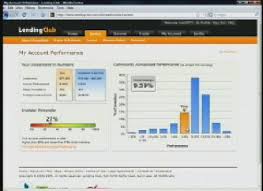- GOLD IRA
- Download Our 2024 Precious Metals IRA Investor’s Guide.
Click Here  Gold IRA
Gold IRA
 Investing
Investing
-
- CRYPTO IRA
- PRICES & STATS
- RETIREMENT PLANS
- BLOG
 Questions? Call (888) 820 1042
Questions? Call (888) 820 1042
Lending Club Review
Disclosure: Our content does not constitute financial advice. Speak to your financial advisor. We may earn money from companies reviewed. Learn more
Last Updated on: 24th March 2023, 11:49 pm

Lending Club
- Phone : 833-536-3639
- URL :
- Global Rating
- Very Good
User Rating
- 0 No reviews yet!
Review Summary :
Lending Club does well what it advertises--- connecting people who need to borrow money with people who have money to loan out. The company is both safe and good with customer service too. Individual risk tolerance is something investors have to reconcile with Lending Club's note quality rating system.
Pros:
- Named the Economist's "Best Place to Work" in the Bay Area in 2013 and 2014
- A+ rating from the Better Business Bureau
- One of the largest credit marketplaces in America
Cons:
- No mobile app available to manage your loans
- Origination fees (3-6%)
- Late fees (greater of 5% or $15)
Quick Facts about Lending Club
Year Founded:2006
Company Headquarters:San Francisco, CA
Reviewed By:David Crowder
Have you purchased products from Lending Club? Leave a review!
A new industry is in town, and it is known as peer to peer lending. This business model is really a giant credit marketplace that matches up those individuals who have funds to invest, or lend out, to those individuals who need to borrow. It is as simple as the borrowers getting their money and paying interest to the lending investors who provide the money they need in the form of loans.
Interest rates are predicated upon the credit history of the borrower, so higher credit scores equate to lower rates and hence lower payments. People who need to borrow have been coming in droves to this industry since they are able to obtain loans at a cheaper rate and with fewer fees than at traditional lending sources such as banks, credit cards, and advances.
Lending Club Intro & Background
For you as an investor, Lending club is the organization that allows you to invest your capital into the personal unsecured loans of fellow citizens. The appeal of this service as an investment lies in the fact that you can realize significantly higher returns of even 9.6%, much greater than the rates offered by competing traditional investments that are fixed-income such as CD's and bonds. The investment opportunity also provides you with means of managing your risk that other types of investment lack. Imagine if you were a bank owner and were also the chief loan officer. You would have the opportunity then to decide which loans you wished to personally approve and invest in and which ones you wanted to avoid. As a class of investment, this is something similar to bonds, where you loan money to individuals instead of to companies who seek to borrow.
For borrowers who receive unsecured loans at rates that are substantially lower than they can get anywhere else, this is a no-brainer; they can hardly lose. Investors have to tread more cautiously and consider all aspects of what is an investment that in theory could lose a large percentage of your original capital, though this is unlikely for a number of reasons that will become clearer.
Lending Club Founder and Management
Founder and CEO Renaud Laplanche is also chairman of the board. Renaud is a heavily decorated leader and disruptor. He was named to Bloomberg Markets' Most INfluential List of 2015, received the Economist Innovation Award in 2014 for category of consumer products, ranked among the top 2015 SMB CEO's from Glassdoor's Employees' Choice Awards, and honored as the 2014 Business Insider “best start up CEO to work for.”
Chief Marketing and Operating Officer Scott Sanborn connects with the customers of Lending Club via PR, advertising, direct marketing, websites, and customer support. He served as eHealthInsurance's Chief Marketing/Revenue Officer and the Home Shopping Network's Senior VP of Marketing prior to working for Lending Club. Scott received the 2014 Sage Group's Marketers that Matter award.
Chief Financial Officer Carrie Dolan handles all aspects of the company's financial management from financial planning, analysis, accounting, tax, treasury, trading and settlement, fund accounting, and investor relations. She served as Charles' Schwab Corporation Treasurer, Schwab Bank's CFO, and Chevron Bank co-founder and CFO while at Chevron.
Chief Technology Officer John Macllwaine handles Lending Club's technology operations and development. John contributes over 2 years experience in financial services technology positions. He acted as Visa's Head of Global Development and Morgan Stanley's CTO.
Lending Club Loans
Lending Club offers three other types of loans besides the unsecured personal loans:
• Business Loans – you are able to borrow needed capital upfront with a from 1 to 5 year repayment term. The monthly payments are fixed, yet there is no early payoff penalty. These are ideal for those one-time business expenses that are substantial. You can actually borrow as much as $300,000 for as little as 5.9%.
• Business Line of Credit – you can obtain the cash flow financing and flexibility your business demands with this open and available to utilize at any point line of credit for your business. Once you draw the line, you have as many as 25 months or sooner to repay.
• Patient Solution Loans – medical patients are able to finance their expensive medical care, thanks to the Lending Club Patient Solutions. The provider needs to sign up for this so patients can benefit from the program. The interest rates are affordable while the approval rates are high. The Club offers true no-interest financing for shorter terms of up to one to two years, as well as extended repayment plans at interest rates running from 3.99% to 19.99%.
How Lending Club Works
In practice, the setup and start up process works out very intuitively and easily for investors. You only need a few minutes of time to get started. Once you are to the account funding stage, you have choices of either mailing them a check or of utilizing an electronic ACH transfer from your bank account. While PayPal used to be among the choices for funding, it no longer is, although if you had a PayPal Prepaid Mastercard Debit Card, you could utilize the routing number and card number as your bank transfer information and still bring the money in from PayPal through the back door this way. Initial deposit requirements are absurdly low, since you only have to put in $25 to start. Minimum investments on every loan note are thus $25 or higher. The notes themselves are graded by Lending Club personally as one of several risk and rate categories. These are from lowest risk and rate of A1 all the way up to highest risk and rate of G5. Naturally as you move up the risk scale from A1 higher and higher towards G5, your interest rate returns grow and improve along with the level of risk you elect.
Just because you apply does not mean that Lending Club will automatically accept you as one of their investors. There are a few requirements that the SEC and every state acting on its own behalf have set up that must be met. There are both income and net worth requirements involved that Lending Club will ask you for, though they do not require you to prove that you actually meet these financial tests. Among these specific requirements are:
- Disallowed States – Forty-five of the states allow you to make these investments. If you are a resident of Nebraska, North Dakota, Main, Idaho, or Iowa then you are out of luck for now.
- Net Worth – In general they are looking for a $70,000 or higher net worth, required by the majority of the states. Yearly income requirements are waived for those of you with in excess of $250,000. Kentucky requires prospective investors to meet the Securities Act qualification as an “accredited investor.”
- Income Level – The majority of the states insist on an annual gross income of at least $70,000. This is higher for California that requires you to claim both an income level and net worth of in excess of $85,000.
- Allocation of Assets – As an investor with Lending Club, you are not permitted to deposit over 10% of your entire net worth into the notes issued by Lending Club.
Lending Club Services
Lending Club's services for borrowers require them to do an online application to be considered for a loan. They may similarly reside in any of the states except for those who do not permit CrowdFunding operations to operate— Nebraska, North Dakota, Maine, Idaho, and Iowa. Receiving approval for one of these loans is not easy, as you must boast a credit score higher than 660, meaning simply that you are not a subprime borrowing candidate. Only a third of borrowers' applications are even accepted at all. This describes a good portion of the risk management service provided by Lending Club, as they are only approving a small fraction of the people applying for loans.
Lending Club loans that you can invest in are only of two types, five year or three year loans. Either of these terms of loans will be unsecured lines of credit, exactly like credit card installment loans. Interest rates, which start at 5.99% APR and run all the way up to 32.99% APR, are fixed for the life of the loan. Interest rates come from the applicants' credit scores and also determine how large a loan they may receive, from as little as a thousand dollars on up to $35,000.
Lending Club reports any of your borrowers who default to the three principal credit rating companies of Experian, Equifax, and TransUnion. They also handle collections on your behalf should a borrower default.
Lending Club Locations
Lending Club has a single office in California. It is found at 71 Stevenson Street, Suite 300
San Francisco, CA 94105.
Lending Club Interface Screenshots






Lending Club Safety
The question as to how safe investments in Lending Club are involves a few different considerations. As far as the risk of the company itself going bankrupt, Lending Club has a backup default arrangement in place with one of the largest collection agencies in the country, Portfolio Financial Servicing Company, to service and collect payments should they no longer be around.
The investments themselves are as safe as the individuals who stand behind each specific note. There is a real risk of default on the loans, since these investments are not at all insured by the FDIC or SIPC. This is to say they are not at all equivalent with Treasuries, CD's from a bank, or even bonds from well-respected and rated companies. Lending Club claims that their overall default rate on loans is approximately 3%, which is not very high, but this has the potential to change at any given time. If you need to exit from these investments before their term is up, then you will have to sell them on the secondary market at a less advantageous price. This is a long-term investment that you should plan to see through for the three to five year term of the loan.
To reduce the impact of defaults, which can and will happen, you should diversify into as many different notes as possible. They recommend a minimum of 100 notes, and suggest 700-800 is better. This way, if you do suffer the default of three to twenty-five notes, it will not destroy your overall rate of return or endanger your principal minimally. You also have great control in theory over how many loans default, since you pick your own notes to underwrite or can also choose to set up filters to pick them for you. Since your own money is very literally at stake, be sure to pick the loans that you will fund carefully and wisely.
Lending Club Complaints
The Better Business Bureau rates Lending Club A+ for its amount of time the business has been in operation, low complaint volume that has been filed with them for a business of their size, their response to the complaints filed, and their successfully resolving a great number of these complaints filed. They have received 124 complaints over the last three years, of which 59 were closed out over the prior year.
Lending Club Customer Support
Lending club is called a highly professional outfit whose service has not disappointed them by a number of individuals who have spoken with them. They do exactly what they say they will. The Peer to Peer lending company has won numerous awards for excellence. They take great pride in their approach for both investing and borrowing that has now been proven to be an award-winning one. The Economist has honored them with the Innovation Award for the Consumer Products category. They were named the Best Place to Work winner for the Bay Area in both 2013 and 2014. Forbes has given them the ranking of number five in the Most Promising Companies.
Another aspect of their customer support is their service they provide to their lenders called the Lending Club Secondary Market. This market is one that Lending Club makes and maintains to help out their investors who need to resell loans that they can not afford to hold until maturity. This secondary market, known as FOLIOfn, is also useful if one or more of your loans is going sour. Besides this, you are able to buy notes from other investors who need to sell for whatever reason.
Lending Club Costs & Fees
Lending Club only charges investors a single, simple fee. This is an annual management fee. At time of review writing, this fee was 1% annually for each note that you own in their Lending Club marketplace, though it used to be .5% a few years ago. Another consideration for costs of making loans this way is the taxes issue. Gains made as a Peer to Peer lender are treated as ordinary income by the IRS, and not as passive investing income. This means that your taxes could be very high on money made here, particularly if you are in a higher tax bracket, as many would be who make the minimum $70,000 – $85,000 per year required by the various states' rules.
Final Words on Lending Club
Lending Club is definitely making waves in the lending industry. CNBC the money channel has named them to their Disruptor 50 list of companies shaking up the world. Inc.500 ranked them among America's Fastest Growing Private Companies. Their CEO has been named the best in the Bay Area by the Bay Area Tech and Innovation Awards for 2014. EY has awarded them its Venture Capital Award of Excellence. What these awards tell you about Lending Club is that the company is admired and successful by many traditional and cutting edged metrics of success.
Does this make it a good place to invest your hard earned risk capital? That depends on your personal risk tolerance. There is nowhere else that you will find a reputable company in the marketplace offering over 9% returns on fixed income investments that are deemed to be reasonably safe. The important part is to make sure that you understand the investment and accompanying risks thoroughly before you sink your $25 per note into hundreds of notes for a total of anywhere from $2,500 – $20,000 principal invested or more. When you get the prospectus on the investments that they will provide, be sure to read it and consider it carefully.

Lending Club
- Phone : 833-536-3639
- URL :
- Global Rating
- Very Good
User Rating
- 0 No reviews yet!
Review Summary :
Lending Club does well what it advertises--- connecting people who need to borrow money with people who have money to loan out. The company is both safe and good with customer service too. Individual risk tolerance is something investors have to reconcile with Lending Club's note quality rating system.
Have you purchased products from Lending Club? Leave a review!



 Silver
Silver Gold
Gold Platinum
Platinum Palladium
Palladium Bitcoin
Bitcoin Ethereum
Ethereum






